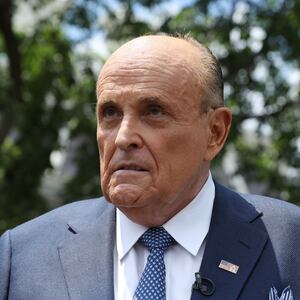Alan Dershowitz has long been the go-to lawyer for prominent MAGA-world figures who are having trouble with the law—from legal advice to legal punditry. But when it comes to former President Donald Trump’s class-action lawsuit against the social media giants who booted him off their platforms, even Dershowitz is currently keeping his distance this time.
And that’s not from a lack of trying from Trump’s legal team.
Two people familiar with the matter tell The Daily Beast that lawyers for the Trump class-action lawsuit against big tech companies reached out to Dershowitz in an attempt to enlist his support in the case. Specifically, the sources say, Trump’s legal team has asked the celebrity attorney if he would write a filing for the lawsuit, potentially an affidavit, in support of the First Amendment and free speech arguments leveled against the companies.
But lately, Dershowitz has been acting less than enthusiastically about the prospect, the sources said.
His reluctance marks another bump in the road for a legal crusade that legal scholars call a fundraising “stunt” doomed to eventual dismissal in federal court.
Dershowitz has pitched in to advise a host of Trumpworld figures over the past few years in the course of their legal troubles. He’s supported Trump with constitutional arguments against impeachment and the Special Counsel’s Russia investigation, signed on to advise MAGA pillow magnate Mike Lindell and his lawyers in his fight against Dominion Voting Systems’ defamation lawsuits, and offered advice to Rudy Giuliani and his attorneys in the criminal investigation into possible unregistered foreign lobbying.
And yet, on this one, Dershowitz isn’t even jumping at the chance to submit an affidavit, at least for now.
Reached for comment on Thursday, Dershowitz told The Daily Beast that he “can’t discuss any conversations that may or may not have happened” on the matter.
John P. Coale, an attorney representing former President Trump in the case, declined to comment when reached by The Daily Beast.
Although Dershowitz won’t comment on the filing, he’s already signaled skepticism of the legal theory underpinning Trump’s social media lawsuits in public comments.
At the heart of Trump’s class-action suit against social media tech giants is the argument that the companies’ legal status “rises beyond that of a private company to that of a state actor,” according to complaints filed in the case, because of civil liability granted by Section 230 of the Communications Decency Act and pressure from congressional Democrats to remove right-wing election and COVID-19 misinformation.
Dershowitz helped craft a similar argument advising MyPillow founder Lindell in his lawsuit against Dominion Voting Systems. Regarding that suit, he’s publicly argued that “Dominion is the government for the purposes of the First Amendment” because it provides technology and services in the administration of elections.
In an opinion piece for The Hill, Dershowitz wrote that while he was generally critical of social media companies’ content moderation practices, he didn’t necessarily buy the argument that “being exempted from some government regulation” turns a private institution into a state actor. He also wondered aloud whether the “proposed remedy” of declaring tech companies to be state actors subject to further government control “is more dangerous than the disease of too much censorship power in the hands of too few unaccountable media oligarchs.”
Trump announced the lawsuit earlier this month after Facebook, Twitter, and YouTube suspended his accounts, citing the risk of violence in the wake of the Jan. 6 insurrection. The lawsuit, he said, marked “a very beautiful development for our freedom of speech” and an attempt at “an end to the shadow-banning, a stop to the silencing, and a stop to the blacklisting, banishing, and cancelling that you know so well.”
The suit asks for Trump and his co-plaintiffs to receive compensation, punitive damages, a reinstatement of their accounts, and demands that a federal judge rule Section 230 as unconstitutional—a key demand of conservatives seeking to punish big tech companies for their content moderation choices.








